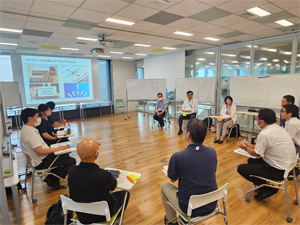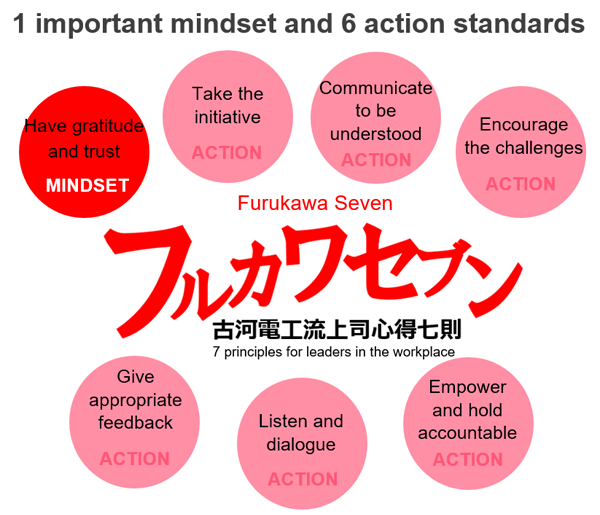We launched the Furukawa E-survey in FY2022 to visualize the state of our human capital and organizational execution abilities, and to reflect the findings in our business operations through targeted improvement measures. The employee engagement score derived from this survey has been set as a sustainability indicator under the 2025 Medium-term Plan, and we are steadily implementing various initiatives to achieve this target. The target for FY2024 was set at 77 for the Group, but the actual result was 72. The main reasons for not meeting the target are presumed to be changes in the respondent composition (the proportion of the parent company and domestic group companies with relatively lower scores has increased) and changes in the business environment of overseas affiliates. We aim to improve through activities to instill our Purpose, revise management practices by supervisors, and promote dialogue within each department.
The score for Furukawa Electric was 63. We held dialogues with individual departments based on these results, obtaining qualitative insights such as “improved communication between managers and subordinates,” “the need to strengthen organizational management structures,” and “a growing demand for enhanced management skills among supervisors.” These findings are being applied to the next round of improvement activities.
Analysis of the survey results revealed improvements in two areas that strongly correlate with higher engagement scores: “degree of instillation of corporate philosophy and policies” and “degree of improvement in operational efficiency.” We believe these trends reflect the positive impact of various initiatives aimed at enhancing employee engagement.
Sustainability Indicators and Targets

From the results of the employee engagement survey, we recognize that instilling our philosophy is a critical initiative strongly correlated with enhancing engagement.
We revised the structure of the Group’s existing Corporate Philosophy and established the Furukawa Electric Group Purpose in March 2024 that serves as the basis for management decisions and inspires each and every employee to take pride in their work and continue taking on challenges. We view the instillation of our Purpose as a four-step process: awareness, understanding, empathy, and action. In FY2024, we launched initiatives focused first on expanding awareness and then on deepening understanding and empathy.

To raise awareness, we implemented a range of measures including the dissemination of top management messages, and conducted internal and external communication activities through videos and posters. To foster understanding and empathy, we created opportunities for employees to reflect on how the Group’s Purpose relates to their own organization, business, and personal purpose, by holding various workshops. Specifically, for senior management, we held workshops across the Group, where participants discussed what the Furukawa Electric Group Purpose means for their respective teams and created their own organizational purpose statements. These were then communicated back to their teams in the participants’ own words, along with the intentions behind them. For general employees, recognizing the importance of understanding their own values, we conducted a pilot “My Purpose Workshop.” This program facilitated understanding of the Group’s Purpose while encouraging participants to explore their personal values and articulate their own purpose.
Within our Group’s philosophy system, we have defined the values we consider essential for sustainable growth into the future as Core Values. To promote their integration, we regularly conduct dedicated workshops and encourage reflection based on these values during routine meetings and other daily interactions.
To ensure that each employee finds fulfillment, a sense of growth, and personal purpose, thereby enhancing organizational engagement and achieving goals, we aim to foster a culture where employees internalize our Purpose and act daily in accordance with our Core Values. We will continue to engage in activities to promote the integration of these principles.
Based on the results of the employee engagement survey, we recognize that transforming into a more productive organization is a critical initiative contributing to engagement.
As part of our workstyle reform initiatives aimed at enabling a broader range of individuals to thrive and enhancing overall productivity, we are promoting measures from both the “work-style reform” and “organizational culture reform” perspectives. We are expanding flexible work systems to support better work-life balance for employees. These include initiatives to support balancing work with life events such as childcare and nursing care, the introduction of remote work arrangements for employees in distant locations, and the continued encouragement of hybrid work models—combining telework and in-office attendance—since the COVID-19 pandemic.
To enhance employee engagement, we aim to improve the management skills of our managerial staff and build an organization that achieves results as a team.
We have established the Furukawa Electric way of Seven Principles for Leaders (Furukawa Seven), which consists of one basic mindset and six action principles for a leader to build a good working team. To put these to work, officers and department and section managers declare that they are committed to follow these principles and act according to them every day. Furthermore, our efforts on leadership transformation include 360-degree feedback surveys of the target personnel with an aim to lead to further behavioral changes.

In revising the personnel system in 2021, we reviewed the operation of the target management system based on the concepts of “promotion of a culture to take on challenge,” “simplicity & openness,” and “human resource development.”
Aiming to align the achievement of individual goals with the achievement of higher-level policies and performance improvement, we reinforce the alignment between departmental and divisional policies and individual goal management. Specifically, members attend meetings when setting organizational goals, “degree of importance” and “qualification requirement levels” are set based on the expected roles for each qualification, and coordination meetings are held to calibrate criteria for goal ranking within departments.
Furthermore, this revision emphasizes strengthening feedback for each employee. We encourage challenging goal-setting at the start of the period and increase the frequency of managerial support and feedback during the period, thereby positively impacting both human resource development and performance improvement. At the end of the period, managers provide feedback on strengths and areas for improvement during one-on-one meetings based on daily work performance, fostering motivation for the following year. Since FY2022, we have been notifying all employees of their performance evaluation scores.
According to the survey conducted in FY2024 on the initial target-setting meeting, more than 90% of employees responded positively, indicating that they “fully understood” or “largely understood” the organizational policy. We believe that the operation of this system is positively received and functioning effectively.